<Back to Index>
- Attorney General Robert Michael Oldfield Havers, 1923
- Chief of Naval Staff Henry Conyers Leach, 1923
- Commander of the Task Force Admiral of the Fleet John David Elliott Fieldhouse, 1928
PAGE SPONSOR
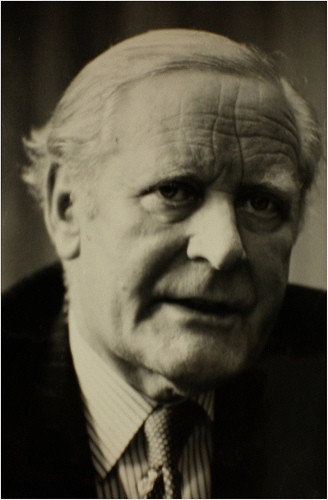
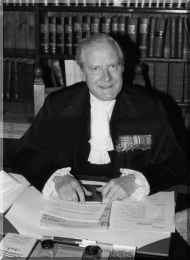
Robert Michael Oldfield Havers, Baron Havers (10 March 1923 - 1 April 1992) was a British barrister and Conservative politician. From his knighthood in 1972 until becoming a peer in 1987 he was known as Sir Michael Havers.
Havers was a son of High Court Judge Sir Cecil Havers and brother of Baroness Butler - Sloss, who in 1988 became the first woman named to the Court of Appeal and later President of the Family Division.
Havers was educated at Westminster School. He served in World War II in the Royal Navy as a 19 year old Midshipman on HMS Sirius (82) in Force Q. He attended Corpus Christi College at the University of Cambridge.
Havers was named a Queen's Counsel in 1964 and became a member of the Privy Council in 1977. He was elected to the House of Commons representing Wimbledon in 1970, a seat he held until 1987. He served as Solicitor General under Edward Heath from 1972 to 1974, and as Attorney - General for England and Wales and Northern Ireland from 1979 to 1987 under Margaret Thatcher. In June 1987 he was appointed Lord Chancellor and consequently became a life peer as Baron Havers, of St Edmundsbury in the County of Suffolk. However, he was forced to resign that October, due to ill health.
In May 1981, at the trial of The Yorkshire Ripper, Peter Sutcliffe, Sutcliffe pleaded not guilty to 13 counts of murder, but guilty to manslaughter on the grounds of diminished responsibility. The basis of this defense was his claim that he was the tool of God's will. Sutcliffe first claimed to have heard voices while working as a gravedigger, that ultimately ordered him to kill prostitutes. He claimed that the voices originated from a headstone of a deceased Polish man, Bronislaw Zapolski, and that the voices were that of God.
He also pleaded guilty to seven counts of attempted murder. The prosecution intended to accept Sutcliffe's plea after four psychiatrists diagnosed him with paranoid schizophrenia. However, the trial judge, Mr Justice Boreham, demanded an unusually detailed explanation of the prosecution reasoning. After a two hour representation by Havers, the Attorney - General, a 90 minute lunch break and a further 40 minutes of legal discussion, he rejected the diminished responsibility plea and the expert testimonies of the four psychiatrists, insisting that the case should be dealt with by a jury. The trial proper was set to commence on 5 May 1981.
Havers drew controversy at the outset of the trial, when he said of Sutcliffe's victims in his introductory speech: "Some were prostitutes, but perhaps the saddest part of the case is that some were not. The last six attacks were on totally respectable women." In response to this remark, the English Collective of Prostitutes accused Havers of "condoning the murder of prostitutes", and women demonstrated outside the Old Bailey with placards in protest.
The trial lasted two weeks and despite the efforts of his counsel James Chadwin QC, Sutcliffe was found guilty of murder on all counts and sentenced to life imprisonment.
Havers represented the Crown in two of the most notable miscarriages of justice in British judicial history: the trial and appeal of the Guildford Four and also of the Maguire family (known as the Maguire Seven), all of whom were wrongfully convicted. Collectively, they served a total of 113 years in prison and one of the Maguire Seven, Giuseppe Conlon, died in prison, convicted on the basis of discredited forensic evidence.
In the case of the Guildford Four, the Director of Public Prosecutions was found to have suppressed alibi evidence that supported Gerry Conlon and Paul Hill’s claims of innocence. The Director of Public Prosecutions, for which Havers was acting, was also found to have suppressed confessions by Provisional IRA bombers, known as the Balcombe Street Gang that they had carried out the Guildford and Woolwich bombings.
In his submission to Sir John May's Inquiry into the Guildford and Woolwich bombings in 1989 Labour MP Chris Mullin's cast doubt on Havers’s integrity in the matter:
His sons are the Honourable Philip Havers, QC and the actor, the Honourable Nigel Havers.Sir Michael Havers represented the Crown at the trials of the Guildford Four, Mrs. Maguire and her family and at the re-trial/appeal of the Guildford Four. He is, therefore, probably the person who can lay claim to the most detailed knowledge of this affair. I respectfully submit that any inquiry that passed without the benefit of his experience would be deficient....
The only hope of sustaining the original convictions was to rewrite the script from top to bottom. This Sir Michael and his colleagues proceeded to do with ingenuity and relish.
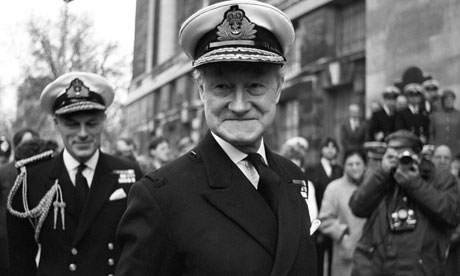
Admiral of the Fleet Sir Henry Conyers Leach, GCB, DL (18 November 1923 - 26 April 2011) was a Royal Navy officer. He served in World War II and then commanded a destroyer and an aircraft carrier before achieving higher command in the Navy. He was the First Sea Lord and Chief of Naval Staff in the early 1980s, the time of the Falklands War. He was instrumental in convincing the Prime Minister Margaret Thatcher that retaking the Falkland Islands from Argentina was feasible. On account of his determination in the Navy's ability to retake the Falklands, Andrew Marr referred to Leach as Thatcher's "Knight in Shining Gold Braid".
Born the third son of John Leach, a naval officer, and Evelyn Burrell Leach (née Lee), Leach was educated at St Peter's Court, Broadstairs and the Royal Naval College, Dartmouth.
Leach joined the Royal Navy as a cadet in 1937 and then, after the Second World War started, served on the battleship HMS Rodney in the South Atlantic and the cruiser HMS Edinburgh in the Indian Ocean. Promoted to midshipman on 1 January 1941, he was assigned to HMS Prince of Wales: however, before he could take up post on board, his father, Captain John Leach, was given command. As a result he was reassigned to HMS Mauritius, which soon went into refit in Singapore. During this refit Leach was assigned to the war room there as a plotting officer. While in Singapore, the Prince of Wales was sunk by the Japanese off Singapore, and Leach's father died in this action. His obituary in the Daily Telegraph notes that "Survivors of the action remembered a forlorn midshipman searching for his father, who was among those lost. Only two nights earlier, Leach and his father had enjoyed a gin sling and a swim." His next post was on the destroyer HMS Sardonyx before being promoted to sub-lieutenant on 1 October 1942 and posted to HMS Duke of York, the flagship of the Home Fleet in January 1943. He was promoted to lieutenant in October 1943. Leach was in command of the "A" turret and he was involved in the Battle of the North Cape in December 1943. In autumn 1944, he was posted to HMS Javelin as the navigating officer. During his posting on Javelin, a mutiny broke out whilst Leach was the Duty Officer: he "conducted himself well under difficult circumstances" and after the mutiny was put down the captain and first lieutenant were re-appointed. Leach was given the position as first lieutenant and the ship was transformed within a few weeks.
In April 1946 Leach transferred to the destroyer HMS Chequers. He was only at this post for a short time as he decided to gain his qualifications as a gunnery specialist at the shore establishment HMS Excellent. After qualifying, he remained at the school as a gunnery instructor until he was posted as gunnery officer to the Second Minesweeping Flotilla in the Aegean Sea. He was promoted to lieutenant commander on 1 February 1952 and attended the Royal Naval Staff College, before becoming a staff officer for the Naval Brigade in London for the coronation of the Queen. In July 1953 he was posted as gunnery officer of the 5th Cruiser Squadron in HMS Newcastle and saw service at the end of the Korean War. He also saw service in the Malayan Emergency of 1955 when HMS Newcastle supported the Army and Royal Marines. He was promoted to commander on 30 June 1955 and served as application commander responsible for bringing the navy's first surface - to - air missile, the Sea Slug, into service. He was then posted to the Admiralty in 1957 and was given his first command in charge of the destroyer HMS Dunkirk in the Mediterranean in 1959.
Leach was posted to the Training Directorate in the Admiralty in July 1961 and then attended the Joint Service Defence College before receiving promotion to captain on 31 December 1961. He became Chief Staff Officer (Plans and Operations) for the Far East Fleet in July 1962 and organized naval support for British ground forces deployed during the Indonesia – Malaysia confrontation. He was appointed captain of the 27th Escort Squadron, which he commanded from the Leander class frigate HMS Galatea, in November 1965. An appointment at the Ministry of Defence followed when he became Director of Naval Plans there in February 1968 before he was given another command, that of the aircraft carrier HMS Albion, in March 1970. Leach was a strong supporter of the abolition of the daily issue of rum at that time. He was appointed Naval Aide - de - Camp to the Queen on 7 July 1970.
Leach became Assistant Chief of the Naval Staff (Policy) at the Ministry of Defence in April 1971, receiving promotion to rear admiral on 7 July 1971, and then became Flag Officer First Flotilla in May 1974, with promotion to vice admiral on 6 July 1974. He became Vice Chief of the Defence Staff in January 1976, and having been appointed a Knight Commander of the Order of the Bath in the 1977 New Year Honours, he was promoted to full admiral on 30 March 1977 on appointment as Commander - in - Chief Fleet and NATO Commander - in - Chief, Channel and Commander - in - Chief Eastern Atlantic. He was advanced to Knight Grand Cross of the Order of the Bath in the 1978 Birthday Honours.
Leach was appointed First Sea Lord and Chief of Naval Staff on 6 July 1979 and in that role fiercely resisted naval cuts proposed by Defence Secretary John Nott.
On 31 March 1982, soon after the Argentine invasion of the Falklands, Leach brushed aside serious doubts from the Secretary of State for Defence Sir John Nott, and addressed the Prime Minister on the appropriate course of action. The Chief of the Defence Staff at the time was on his way back from a foreign visit, and in addressing the Prime Minister, Leach effectively bypassed the Acting Chief of the Defence Staff. When he was asked if retaking the islands was possible, he replied "Yes we can recover the islands." He then added "and we must!" Thatcher replied "Why?" Leach exclaimed "Because if we do not, or if we pussyfoot in our actions and do not achieve complete success, in another few months we shall be living in a different country whose word counts for little." Leach then explained how the task force would take shape and what ships would be involved: when asked about the lack of available aircraft carriers, Leach reassured the Prime Minister that the two small carriers available would suffice. Thatcher approved this and preparations were made to send a task force to set sail to retake the Falklands. On account of his determination, Andrew Marr referred to Leach as Thatcher's "Knight in Shining Gold Braid" in his documentary series History of Modern Britain. Leach was promoted to Admiral of the Fleet upon retirement in December 1982.
In his retirement Leach published his memoirs entitled Endure no Makeshifts. He involved himself in several charitable organizations and acted as President of the Sea Cadet Association from 1983 to 1993. He was the Chairman of the Council of the King Edward VII Hospital as well as being a chairman of the Royal Navy Club of 1765 & 1785 (United 1889).
In 2004 it was announced that the new Navy Command Headquarters building of the Royal Navy at Whale Island, Portsmouth, was to be named the "Sir Henry Leach Building" in his honor.
Leach lived at Wonston in Hampshire and served as Deputy Lieutenant of Hampshire. His interests included shooting, fishing and gardening. He died on 26 April 2011 at the age of 87. A Service of Thanksgiving held in his honor was attended by representatives of the British Royal Family, including the current First Sea Lord Admiral Sir Mark Stanhope in attendance on behalf of the Queen and the Duke of Edinburgh.
In 1958 Leach married Mary Jean McCall, daughter of Admiral Sir Henry McCall; they had two daughters.
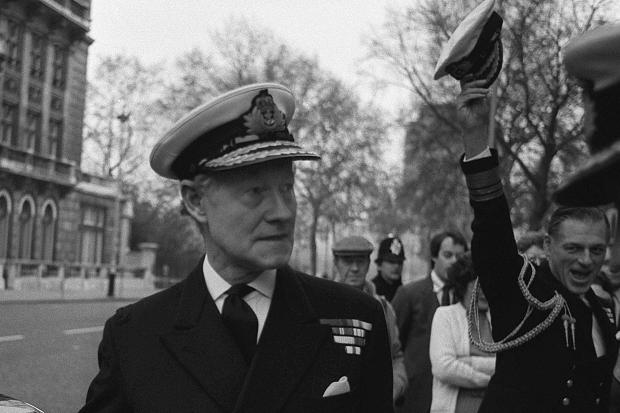
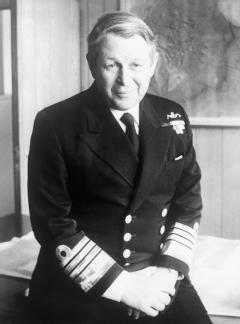
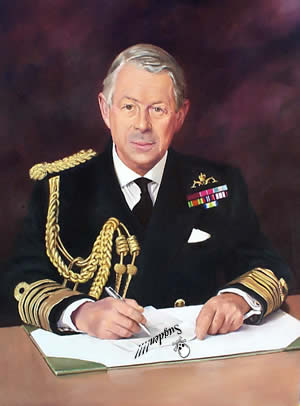
Admiral of the Fleet John David Elliott Fieldhouse, Baron Fieldhouse, GCB, GBE (12 February 1928 - 17 February 1992) was a Royal Navy officer. He commanded five submarines and a frigate before achieving higher command in the Navy. Following the invasion of the Falkland Islands by Argentine forces in April 1982, Fieldhouse was appointed Commander of the Task Force (designated Task Force 317), given responsibility for "Operation Corporate", the mission to recover the Falkland Islands. The campaign ended in the surrender of Argentine forces in June 1982. He became First Sea Lord and Chief of Naval Staff in December 1982 and, in that role, persuaded the British Government to fund the replacement of ships lost in the Falklands War. He went on to be Chief of the Defence Staff in the mid 1980s.
Born the son of Sir Harold Fieldhouse, who had been secretary of the National Assistance Board, and Mabel Elaine Fieldhouse (née Elliott), Fieldhouse was educated at the Royal Naval College, Dartmouth.
Fieldhouse joined the Royal Navy as a cadet in 1944. He was promoted to midshipman on 1 September 1945 and posted to the cruiser HMS Norfolk in November 1945. Promoted to sub-lieutenant on 1 May 1947 he joined the Submarine Service in 1948 and was posted to the submarine HMS Thule in March 1949. He was promoted to lieutenant on 1 October 1949 and subsequently served in the submarines HMS Astute, HMS Aeneas and then HMS Totem. He completed the Submarine Command Course in 1955.
Fieldhouse took command of his first submarine, HMS Subtle in January 1956 and went on to command the submarine HMS Acheron in March 1956. Promoted to lieutenant commander on 1 October 1957, he took command of the submarine HMS Tiptoe in June 1958 and then joined the Department of Nuclear Science and Engineering at the Royal Naval College Greenwich. He went on to command the submarine HMS Walrus from January 1961 and was promoted to commander on 31 December 1961. In July 1964 he took command of HMS Dreadnought, the Royal Navy's first nuclear submarine. He attended the Joint Service Defence College in 1966, after which he became Second-in-Command of the aircraft carrier HMS Hermes. With her, Fieldhouse was involved in the preparation for the British withdrawal from Aden during the Aden Emergency. Promoted to captain on 31 December 1967, he moved to Faslane Naval Base, Scotland to command the 10th Submarine Squadron of Resolution class submarines. From October 1970, he commanded HMS Diomede, a frigate, as part of his overall command of the 3rd Frigate Squadron.
In 1972, with his promotion to commodore, Fieldhouse took command of the Standing Naval Force Atlantic. He then moved to the Ministry of Defence, initially as Deputy Director of Naval Warfare and then, from November 1973, as Director of Naval Warfare. Promoted to rear admiral on 7 January 1975, he became Flag Officer Second Flotilla in December 1974 and then Flag Officer Submarines as well as NATO Commander Submarines Eastern Atlantic in November 1976. He was promoted to vice admiral on 1 April 1978 and became Controller of the Navy in January 1979. He was appointed Knight Commander of the Order of the Bath in 1980 New Year Honours.
Fieldhouse became Commander - in - Chief Fleet and NATO Commander - in - Chief, Channel and Commander - in - Chief Eastern Atlantic in April 1981 and received promotion to full admiral on 23 July 1981. Following the invasion of the Falkland Islands by Argentine forces in April 1982, Fieldhouse was appointed Commander of the Task Force (designated Task Force 317), given responsibility for "Operation Corporate", the mission to recover the Falkland Islands. He conducted the campaign, which ended in the surrender of Argentine forces in June 1982, from the Northwood Command Centre. He was advanced to Knight Grand Cross of the Order of the Bath in the 1982 Birthday Honours and appointed a Knight Grand Cross of the Order of the British Empire on 11 October 1982 "in recognition of service within the operations in the South Atlantic".
Fieldhouse became First Sea Lord and Chief of Naval Staff on 1 December 1982: in that role he persuaded the British Government to fund the replacement of ships lost in the Falklands War. He was promoted to Admiral of the Fleet on 2 August 1985 and became Chief of the Defence Staff later that month. He retired in December 1988.
Fieldhouse was made a life peer as Baron Fieldhouse, of Gosport in the County of Hampshire in 1990. In retirement he became a consultant to Vosper Thornycroft plc and his interests included sailing. In 1992 he had a major heart operation in Southampton General Hospital, subsequent to which he caught an infection and died there on 17 February 1992.
In 1953 Fieldhouse married Margaret ('Midge') Cull; they had a son and two daughters.